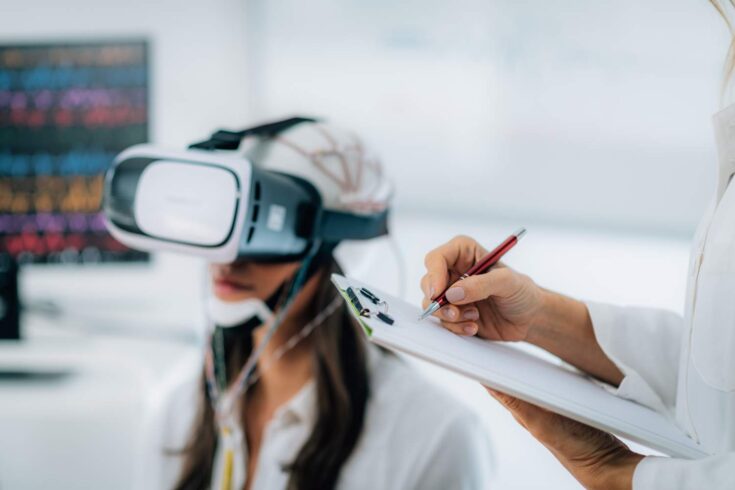A virtual reality (VR) hand, controlled by the mind, could help stroke patients restore hand movement as part of VR assisted physiotherapy.
Funded as part of UK Research and Innovation (UKRI)’s Audience of the Future challenge, Cogitat is a startup founded last year to turn research by Imperial into products that help people.
So, it’s exploring medical and gaming applications of its core technology. This is a brain-computer interface that allows users to move in VR environments by mentally willing themselves to move rather than physically moving.
Impaired upper limb movement
Many stroke patients suffer from impaired upper limb movement due to disrupted connections between their brains and muscles.
However, thanks to the brain’s plasticity this can often be restored using regular physiotherapy exercises that help reconfigure the connections.
Cogitat and VR production studio Unit 9, with support from UKRI, are exploring the potential for games powered by a brain-computer interface. This involves a virtual hand performing the movements that the patient is attempting to make.
This programme will help patients practise and improve their performances in a range of hand exercises.
More rewarding experience
Allan Ponniah, Cogitat’s CEO, explains:
If you can’t move your hand at all, repeated practice can be very frustrating, but the games we are developing will offer a more rewarding experience.
Initially, users just imagine their movements and they see their hands moving in VR. As time goes on, it helps calibrate their hands.
Once they move their hands a little bit, this is represented in the VR experience as a more successful performance.
This pushes them towards a situation where they can, for example, fully open and close a fist.
Motivated by research
The concept for the games is motivated by research in neuroscience.
The research suggest that the experience of seeing a motor task performed helps you develop the motor skills needed to perform that task yourself.
This is done by stimulating so-called mirror neurons, brain cells that are activated both by witnessing and performing motor tasks.
The proposed VR rehabilitation games could be used as part of physiotherapy sessions at clinics, but also have the potential advantage of helping patients to carry out exercises at home.
Game elements such as the opportunity to compete online with other ‘players’ or to try to beat one’s own past performances could make the exercises more enjoyable.
Making a real difference
Andrew Chitty, Audience of the Future challenge director at UKRI, says:
Combining Cogitat’s ground-breaking technology of brain-computer interfaces with the capabilities of VR and games technology offers the potential of making a real difference to the rehabilitation of stroke sufferers, one of the commonest causes of chronic disability in the UK.
This is a fantastic example of the potential for deep tech innovation from the life sciences to cross fertilise with creative technologies, engage patients in their own care and build businesses that will revolutionise healthcare.
A deep tech company
Dr Dimitrios Adamos, Imperial research fellow and Cogitat’s co-founder and Chief Technology Officer, says:
We are a deep tech company that develops cutting-edge artificial intelligence or machine learning-powered brainwave decoders trained on real-life electroencephalography (EEG) data.
Our device-agnostic technology can interface with any EEG headset and sensor configuration, including devices that haven’t even hit the market.
EEG devices, which use electrical activity on the scalp as a proxy for brain activity, are far cheaper than other forms of brain imaging such as magnetic resonance imaging.
They’re also portable enough to use outside research settings.

